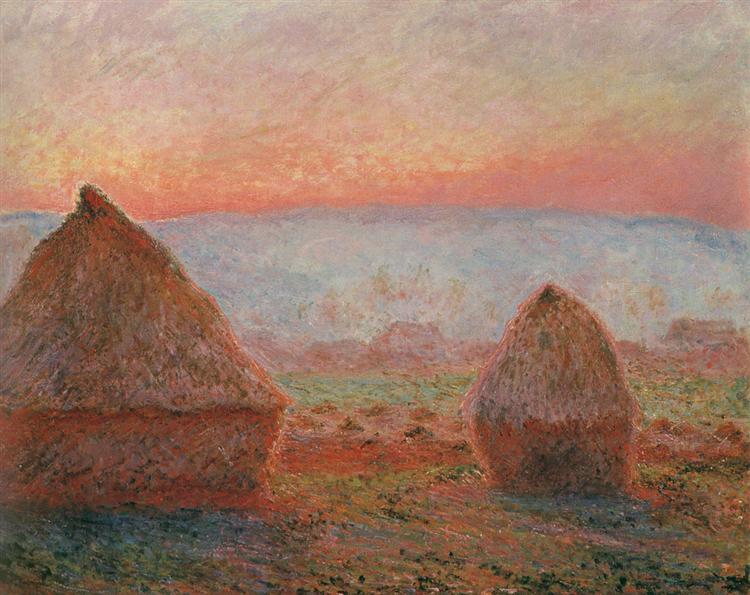Description
Claude Monet's "Haystacks at Giverny - The Evening Sun" (1888) is an exquisite example of the innovative approach and aesthetic sensitivity that characterize the French painter, one of the main representatives of Impressionism. In this painting, as in many of his works, Monet captures the ephemeral essence of natural light and its interaction with the surrounding landscape. The choice of subject, in this case a set of haystacks illuminated by the evening light, is emblematic of the artist's interest in depicting rural life and the cycles of nature.
The composition is structured around one of the iconic haystacks that Monet observed in his surroundings, using an almost abstract approach in the representation of form. The haystacks are depicted in an organic manner, with soft contours that seem to blend into the surroundings, standing out even in their imperfection. The light of the setting sun imbues the work with a warm and nostalgic atmosphere, where the golds and oranges contrast poetically with the greens and blues of the surrounding landscape. Monet manages to establish a rich and enveloping chromatic symphony, evoking both calm and dynamism.
It is interesting to note that there is no human presence in this work, allowing the viewer to become completely immersed in the harmony of the landscape. The absence of human figures could be interpreted as a commentary on the inherent connection between the earth and the human being, suggesting that the beauty of the natural environment has a value of its own, distant from human activity.
Monet's impressionist technique, characterised by loose brushwork and shifting angles of light, is manifest here through the vibrant texture of the painting's surface, where the application of colours becomes almost tactile. The overlapping layers and splashes of vibrant colour confer movement, a sense of immediacy that more traditional techniques could not capture.
Such depictions of haystacks at Giverny are not unique to Monet's oeuvre. During the late 1880s, the artist explored this theme repeatedly, highlighting his interest in the variation of light at different times of day and in different seasons. This series of paintings thus becomes a testament to the constant change and transience of nature, a central theme in Impressionism.
The work, housed in the collection of the Museum of Fine Arts in Boston, is an excellent example of Monet's ability to capture the feeling of place. His search for light, atmosphere and emotion in nature underscore not only his technical mastery but also his deep connection with the environment that inspired him. This ability invites us to look beyond the merely visual and connect with a vital experience that remains in the present, often ephemeral moment that Monet so valued.
KUADROS ©, a famous painting on your wall.
Hand-made oil painting reproductions, with the quality of professional artists and the distinctive seal of KUADROS ©.
Painting reproduction service with satisfaction guarantee. If you are not completely satisfied with the replica of your painting, we will refund 100% of your money.

